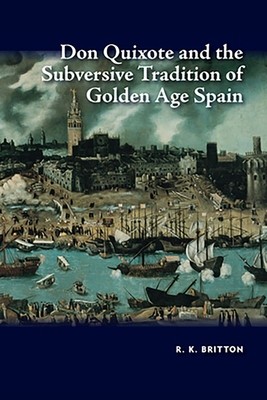
- We will send in 10–14 business days.
- Author: R K Britton
- Publisher: Liverpool University Press
- ISBN-10: 1845198611
- ISBN-13: 9781845198619
- Format: 15 x 22.9 x 1.8 cm, kieti viršeliai
- Language: English
- SAVE -10% with code: EXTRA
Don Quixote and the Subversive Tradition of Golden Age Spain (e-book) (used book) | bookbook.eu
Reviews
Description
This study offers a reading of Don Quixote, with comparative material from Golden Age history and Cervantes life, to argue that his greatest work was not just the hilariously comic entertainment that most of his contemporaries took it to be. Rather, it belongs to a subversive tradition of writing that grew up in sixteenth-century Spain and which constantly questioned the aims and standards of the imperial nation state that Counter-reformation Spain had become from the point of view of Renaissance humanism. Prime consideration needs to be given to the system of Spanish censorship at the time, run largely by the Inquisition albeit officially an institution of the crown, and its effect on the cultural life of the country. In response, writers of poetry and prose fiction -- strenuously attacked on moral grounds by sections of the clergy and the laity -- became adept at camouflaging heterodox ideas through rhetoric and imaginative invention. Ironically, Cervantes success in avoiding
the attention of the
EXTRA 10 % discount with code: EXTRA
The promotion ends in 23d.08:24:31
The discount code is valid when purchasing from 10 €. Discounts do not stack.
- Author: R K Britton
- Publisher: Liverpool University Press
- ISBN-10: 1845198611
- ISBN-13: 9781845198619
- Format: 15 x 22.9 x 1.8 cm, kieti viršeliai
- Language: English English
This study offers a reading of Don Quixote, with comparative material from Golden Age history and Cervantes life, to argue that his greatest work was not just the hilariously comic entertainment that most of his contemporaries took it to be. Rather, it belongs to a subversive tradition of writing that grew up in sixteenth-century Spain and which constantly questioned the aims and standards of the imperial nation state that Counter-reformation Spain had become from the point of view of Renaissance humanism. Prime consideration needs to be given to the system of Spanish censorship at the time, run largely by the Inquisition albeit officially an institution of the crown, and its effect on the cultural life of the country. In response, writers of poetry and prose fiction -- strenuously attacked on moral grounds by sections of the clergy and the laity -- became adept at camouflaging heterodox ideas through rhetoric and imaginative invention. Ironically, Cervantes success in avoiding
the attention of the


Reviews